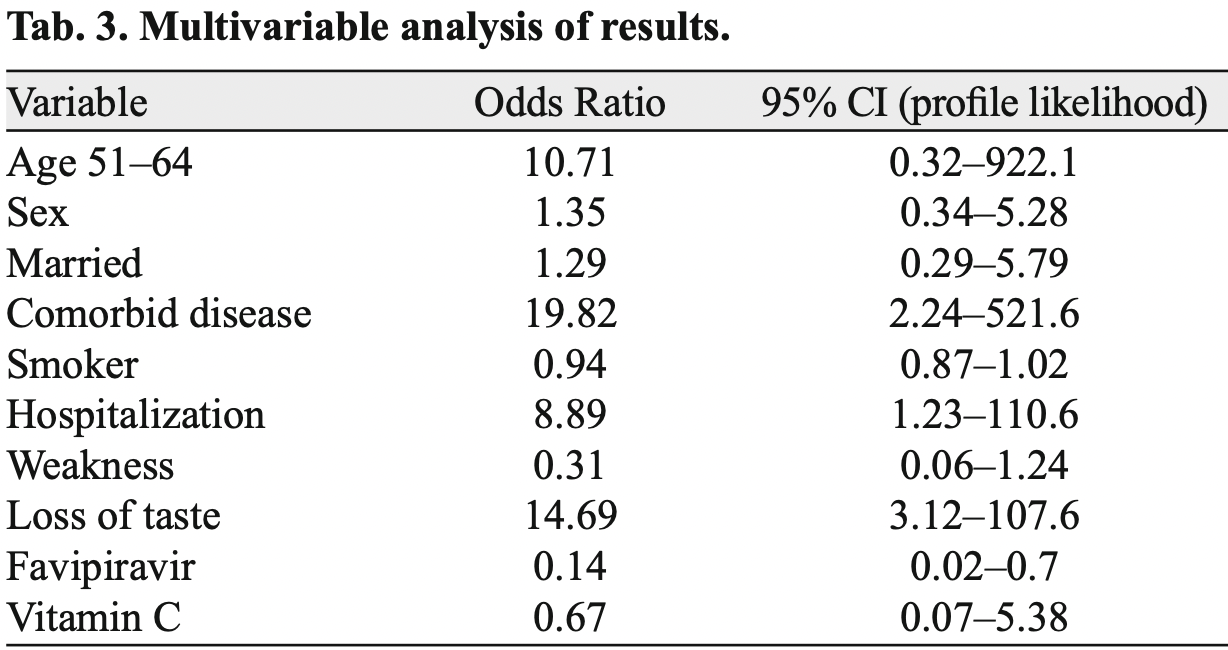
The factors affecting the prolonged PCR positivity in COVID-19 patients
et al., Bratislava Medical Journal, doi:10.4149/BLL_2022_082, Jun 2022
Vitamin C for COVID-19
6th treatment shown to reduce risk in
September 2020, now with p = 0.000000068 from 74 studies, recognized in 22 countries.
No treatment is 100% effective. Protocols
combine treatments.
6,400+ studies for
210+ treatments. c19early.org
|
Retrospective 126 patients in Turkey, showing no significant difference in PCR+ at day 14 with vitamin C treatment.
This is the 48th of 74 COVID-19 controlled studies for vitamin C, which collectively show efficacy with p=0.000000068.
21 studies are RCTs, which show efficacy with p=0.0012.
Study covers vitamin C and favipiravir.
|
risk of no viral clearance, 33.0% lower, OR 0.67, p = 0.73, treatment 31, control 95, adjusted per study, multivariable, day 14, RR approximated with OR.
|
| Effect extraction follows pre-specified rules prioritizing more serious outcomes. Submit updates |
Usanma Koban et al., 7 Jun 2022, retrospective, Turkey, peer-reviewed, 3 authors, study period 1 March, 2020 - 30 September, 2020, dosage not specified.
Contact: buguukoban@gmail.com.
The factors affecting the prolonged PCR positivity in COVID-19 patients
Bratislava Medical Journal, doi:10.4149/bll_2022_082
OBJECTIVES: The aim of this study is to investigate the effects of factors such as age, gender, comorbid diseases and treatments applied on the positive duration of the PCR test in COVID-19 patients. Background: The duration of PCR positivity in COVID-19 patients varies. Studies in the literature investigating factors that may affect this duration are limited. METHODS: Between March and September 2020, individuals with two or more positive PCR results with a 14-day interval were included in the case group, and those whose PCR results turned negative within 14 days were included in the control group. The relationship between age, gender, contact environment, presence of additional disease, drugs used, smoking and alcohol consumption; type, duration and severity of COVID-19 symptoms, treatment applied for COVID-19 and duration of PCR positivity were examined. RESULTS: Among 126 participants the mean duration of PCR positivity was 23.38 days (min 6, max 52). Symptoms lasted 15-30 days in 41 patients (32.5 %) and 5 -10 days in 30 patients (23.8 %). The positivity duration varied according to age, smoking and alcohol consumption status, and body mass index. Patients with chronic disease, and who had loss of taste and smell during the disease had a longer positive stay. This period was shorter in favipiravir users. CONCLUSION: In COVID-19 infection, there are several factors that affect the PCR test to remain positive. Early-term favipiravir use may shorten this period as a modifi able factor (Tab. 3, Ref. 14). Text in PDF www.elis.sk
References
Aldhaeefi, Tahir, Cote, Izzy, Khoury, Comorbidities and Age Are Associated With Persistent COVID-19 PCR Positivity, Front Cell Infect Microbiol
Bulut, Kato, Epidemiology of COVID-19, Turk J Med Sci
Carmo, Pereira-Vaz, Mota, Mendes, Morais et al., Clearance and persistence of SARS-CoV-2 RNA in patients with COVID-19, J Med Virol
Cento, Colagrossi, Nava, Lamberti, Senatore et al., Persistent positivity and fl uctuations of SARS-CoV-2 RNA in clinicallyrecovered COVID-19 patients, J Infect
Erensoy, COVID-19 Pandemisinde SARS-CoV-2 ve Mikrobiyolojik Tani Dinamikleri, MİKROBİYOLOJİ Bül
Fu, Li, Guo, He, Liu et al., Dynamics and Correlation Among Viral Positivity, Seroconversion and Disease Severity in COVID-19: A Retrospective Study, Ann Intern Med Nisan
Ikegami, Benirschke, Flanagan, Tanna, Klein et al., Persistence of SARS-COV-2 nasopharyngeal swab PCR positivity in COVID-19 convalescent plasma donors, Transfusion
Li, Liu, Zhang, Xu, Dai et al., SARS-CoV-2 and viral sepsis: observations and hypotheses, Lancet Lond Engl
Liu, Yan, Wan, Xiang, Le et al., Viraldynamics in mildand severe cases of COVID-19, Lancet Infect Dis
Lu, Yin, Li, Fu, Hu et al., Clinical characteristics and factors affecting the duration of positive nucleic acid test for patients of COVID-19 in XinYu, China, J Clin Lab Anal
Rabaan, Tirupathi, Sule, Aldali, Mutair et al., Viral Dynamics and Real-Time RT-PCR CtValues Correlation with Disease Severity in COVID-19, Diagn Basel Switz
Suri, Mittal, Tiwari, Mohan, Hadda et al., CO-VID-19 Real-Time RT-PCR: Does Positivity on Follow-up RT-PCR Always Imply Infectivity?, Am J Respir Crit Care Med
Van Kampen, Van De Vijver, Fraaij, Haagmans, Lamers et al., Duration and key determinants of infectious virus shedding in hospitalized patients with coronavirus disease-2019 (COVID-19), Nat Commun
Xu, Chen, Yuan, Yi, Ding et al., Factors Associated With Prolonged Viral RNA Shedding in Patients with Coronavirus Disease 2019 (COVID-19), Clin Infect Dis Publ Infect Dis Soc Am
DOI record:
{
"DOI": "10.4149/bll_2022_082",
"ISSN": [
"1336-0345"
],
"URL": "http://dx.doi.org/10.4149/BLL_2022_082",
"author": [
{
"affiliation": [],
"family": "USANMA KOBAN",
"given": "Bugu",
"sequence": "first"
},
{
"affiliation": [],
"family": "AYKAN",
"given": "Sanem Aslihan",
"sequence": "additional"
},
{
"affiliation": [],
"family": "DEMIR",
"given": "Sinem",
"sequence": "additional"
}
],
"container-title": "Bratislava Medical Journal",
"container-title-short": "BLL",
"content-domain": {
"crossmark-restriction": false,
"domain": []
},
"created": {
"date-parts": [
[
2022,
6,
7
]
],
"date-time": "2022-06-07T19:31:21Z",
"timestamp": 1654630281000
},
"deposited": {
"date-parts": [
[
2022,
6,
7
]
],
"date-time": "2022-06-07T19:31:31Z",
"timestamp": 1654630291000
},
"indexed": {
"date-parts": [
[
2022,
6,
10
]
],
"date-time": "2022-06-10T19:34:27Z",
"timestamp": 1654889667651
},
"is-referenced-by-count": 0,
"issue": "07",
"issued": {
"date-parts": [
[
2022
]
]
},
"journal-issue": {
"issue": "07",
"published-online": {
"date-parts": [
[
2022
]
]
}
},
"member": "2638",
"original-title": [],
"page": "514-517",
"prefix": "10.4149",
"published": {
"date-parts": [
[
2022
]
]
},
"published-print": {
"date-parts": [
[
2022
]
]
},
"publisher": "AEPress, s.r.o.",
"reference-count": 0,
"references-count": 0,
"relation": {},
"resource": {
"primary": {
"URL": "http://www.elis.sk/index.php?page=shop.product_details&flypage=flypage.tpl&product_id=7706&category_id=179&option=com_virtuemart"
}
},
"score": 1,
"short-title": [],
"source": "Crossref",
"subject": [
"General Earth and Planetary Sciences",
"General Environmental Science"
],
"subtitle": [],
"title": "The factors affecting the prolonged PCR positivity in COVID-19 patients",
"type": "journal-article",
"volume": "123"
}
usanmakoban
